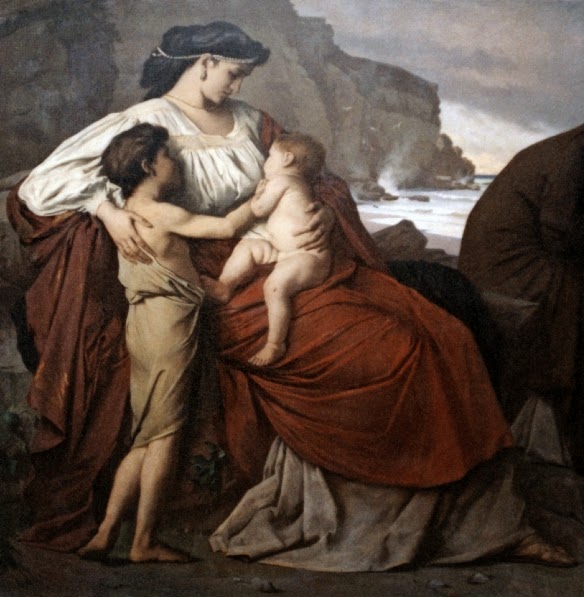Hippodamia1
In Greek mythology, Hippodamia was described as the daughter of King
Oenomaus of Pisa and Evarete of Argos (the daughter of Acrisius and Eurydice) or Eurythoe (daughter of Danaus).
 |
| Hippodamia................ |
Hippodamia's father, King
Oenomaus, fearful of a prophecy that claimed he would be killed by his son-in-law or had an incestuous love for his daughter, had killed thirteen or eighteen suitors of Hippodamia after defeating them in a chariot race and affixed their heads to the wooden columns of his palace.
Pelops, son of King
Tantalus of Lydia, came to ask for Hippodamia's hand in marriage and prepared to race Oenomaus. Worried about losing, Pelops went to the seaside and invoked
Poseidon, his former lover.Reminding Poseidon of their love, he asked
Poseidon for help. Smiling,
Poseidon caused a chariot drawn by winged horses to appear. Still unsure of himself, Pelops or Hippodamia convinced Oenomaus's charioteer, Myrtilus, a son of
Hermes, to help him win. Myrtilus was convinced by
Pelops or Hippodamia promising him half of Oenomaus' kingdom and the first night in bed with Hippodamia.
 |
| Hippodamia, Pelops and Myrilus |
The night before the race, while Myrtilus was putting Oenomaus's chariot together, he replaced the bronze linchpins attaching the wheels to the chariot axle with fake ones made of beeswax. The race began, and went on for a long time. But just as Oenomaus was catching up to
Pelops and readying to kill him, the wheels flew off and the chariot broke apart. Myrtilus survived, but Oenomaus was dragged to death by his horses. When Myrtilus tried to claim his reward and have sex with Hippodamia, Pelops killed Myrtilus by throwing him off a cliff into the sea.
Hippodamia married
Pelops, and their daughters were Astydameia, Nicippe, Lysidice, Mytilene, and Eurydice, and their sons were
Atreus,
Thyestes, Pittheus, Alcathous, Troezen, Hippalcimus, Copreus, Dias, and Hippasus.
By nymph Axioche,
Pelops had a son
Chrysippus and Pelops loved Chrysippus best of all his sons.In some versions, when Chrysippus was kidnapped by king Laius of Thebes, Hippodameia at night visited Laius and Chrysippus, when they were asleep, and taking the sword of the Theban, she wounded Chrysippus and fixed the sword in his body, so that Laius would be suspected. However, Chrysippus acknowledged the truth before dying and Pelops banished his wife. Later Hippodamia committed suicide.
In other versions,
Chryssipus was killed out of jealousy by Atreus and Thyestes, his half-brothers, who cast him into a well. They had been sent by their mother, Hippodamia, who feared
Chrysippus would inherit Pelops's throne instead of her sons. Atreus and Thyestes, together with their mother, were banished by
Pelops and took refuge in Mycenae. There Hippodamia hung herself.
Posts related
Chryssipus :
Pelops
Hippodamia 2
In Greek mythology, Hippodamia was described as the daughter of Atrax or Butes, and was the bride of King
Pirithous of the Lapiths. At the wedding of Hippodamia and
Pirithous, the Centaurs had been invited.
 |
| Centaurs attempted to abduct and rape..............Hippodamia |
Unused to wine, Centaurs wild nature came to the fore. When bride was presented to greet the guests, Centaur Eurytion leapt up and attempted to rape or abduct her. All the other centaurs attempted to rape or abduct female guests in wedding feast. Pirithous and his friend
Theseus, led the Lapiths to victory over the Centaurs in the battle known as the Centauromachy. With Pirithous, she mothered Polypoetes, but died shortly after her son's birth.
Post related
:
Atreus :
Pirithous :
Theseus
Index









.jpg)




















.jpg)




.jpg)
